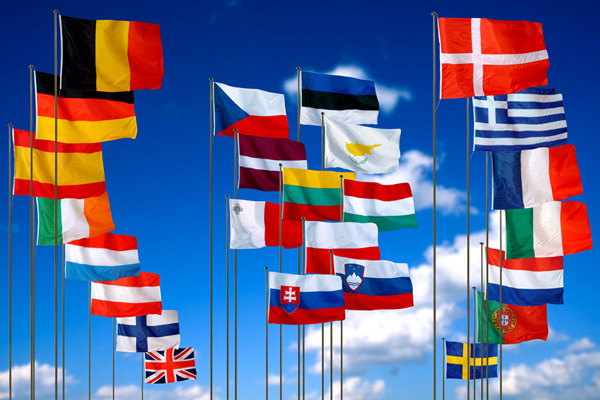In recent years, the EU has moved its focus away from enlargement towards greater integration, especially in fiscal matters. This also comes at a time when the UK is seeking to renegotiate its relationship with the EU, and as the likelihood of Turkey joining the EU as a full member is increasingly remote. In light of these challenges, Andrew Duff MEP proposes a new type of associate membership, where countries would agree to the EU’s values, but not to all its activities or political objectives. This, he argues, would give some countries a springboard towards membership, and others, an alternative to it. To do nothing instead, he writes, would pose risks that any future treaty changes would be blocked by one or other member state.
The European Union is steadying itself to deepen its integration, especially in fiscal matters. In all probability, a Convention will be called in spring 2015 to codify in EU treaty form the measures undertaken by way of crisis management in the course of the current recession (including the incorporation of the Fiscal Compact Treaty), as well as to rectify some of the mistakes made in the Lisbon treaty. A large majority of the governments of the member states of the Union, the European Commission and the European Parliament will support that general approach.
At the same time, with the exception of Iceland, the prospect of new member states joining the Union is remote. Turkey appears to have changed its mind about accession, not least because the problem of Cyprus remains intractable, but also because the ruling party is more and more overtly Islamic in its orientation. There is in any case no prospect of an agreement among the EU’s member states about accepting Turkey as a full member.
Although they keep the aspiration to join the Union, no country in the Western Balkans is ready to assume the responsibilities of EU membership for many years. None are free of systemic corruption or of security problems with their neighbours. All will require a longer time for deeper preparation for EU accession than was available for Romania or Bulgaria – or, for that matter, Croatia.
So, as the federal process quickens within the Union, the threshold is raised for all prospective future members. It is important that all candidate states are made aware of the likely changing nature of the Union which they aspire to join. The Treaty of Lisbon is no longer the benchmark.
Equally, one large member state, the United Kingdom, has called for a renegotiation of its own terms of membership of the Union in the hope of loosening the ties that bind. The UK, which will have to approve the revised treaty in a referendum, has the legal right to veto deeper integration for everyone else. Even if the Conservative Party is not a member of the next British government, foreseen in spring 2015, there will be few in Britain ready and willing to campaign for UK membership of the federal union which involves, above all and in the first instance, sterling joining the single currency.
Multi-Tier Governance
Despite these strong centrifugal forces, it is in everyone’s interests that the European Union which emerges from its present troubles is capable of providing a pole of stability, liberty and prosperity on a continental scale. This matters for Britain just as much as for Eastern Europe. There is a similar perception of the need for a strong Europe in the suddenly volatile Mediterranean, and across the crisis-ridden Middle East.
In the past, it has been assumed that all current and future states of the Union can proceed along the same chosen path, albeit at different speeds. Palpably, this is no longer the case. The Treaty of Lisbon itself bastardised by the failure of the earlier constitutional treaty may prove to have been the last treaty designed to corral all member states.
It is therefore wise and timely to use this critical situation to introduce the EU to more sophisticated multi-tier arrangements. Although some elements of more differentiated integration can be rendered by using the enhanced cooperation provisions of the Lisbon treaty, a more radical change is needed if the variable geometry with which we are now faced is to have solid constitutional legitimacy.
The Brits, the Turks and the Rest
Over the years, the UK has won a large number of opt-outs and derogations from the core of the acquis communautaire, and has managed to install a number of emergency brakes into the institutional procedures. It declines to join the euro or Schengen. It now wants even less Europe. Prime minister David Cameron is demanding the repatriation of powers and competences from Brussels to London. These demands, which are to be spelled out unilaterally by the coalition government at the end of 2014, are sure to jeopardise the cohesion of the single market and the integrity of EU law.
The UK government is already prepared, as no previous British administration has been, to absent itself from the Council table when matters of fiscal union are being negotiated. It has also declined to participate in the single supervisory mechanism of the banking union. The British Conservatives want fewer rights from the Union in exchange for fewer duties. At the same time, Tory leaders preach across the Channel about ‘the remorseless logic of fiscal union’, and encourage other EU countries to go forward to deeper integration without the UK. Missing the point, the Labour leadership accuses the Tories of sleep-walking towards the exit. In fact, the Tories are wide awake and have found the emergency stairway.
At the other end of Europe, the Turks mull over a new form of relationship with the EU (and with NATO). The old nostrum of a ‘privileged partnership’ outside the Union is clearly unacceptable to Ankara, not least because it was always difficult to find much privilege in what was always a highly ambiguous concept. (Turkey has had a customs union with the EU since 1995.) Ministers of the ruling AKP make it clear that Turkey is not prepared to pool national sovereignty with the Europeans to anything like the extent that will be required by the more federal EU. Like the British, the Turks want to opt out of the euro. Like the British, the Turks want of Europe a common market and a security relationship. Neither the Turks nor the Brits seem to like European fundamental rights. It does not go unnoticed that the UK is the strongest advocate of Turkey’s membership of the EU, but the suspicion is rife that the British Tories want further enlargement mainly in order to dilute further integration.
Prime minister Recep Tayip Erdogan cannot bring himself to admit that anything other than full membership is acceptable (while declining to do the things needed to bring it about). However, foreign minister Ahmet Davutoglu and other ministers are more subtle, and favour openly a reappraisal of EU relations. Turkey’s opposition parties, adhering more to the classic state ideology of Kemalism, are ill-equipped to be ambassadors of EU enlargement. Meanwhile, Kemal Dervis, Turkey’s global statesman, prefers to talk of an ‘organised diversity’ of the EU within which Turkey would find a durable and respectable place as an associate member.
There is a third category of European state for which a new class of associate membership might prove to be an irresistible offer. Under the current arrangements of the European Economic Area, Iceland, Norway and Liechtenstein have the status of virtual member states of the Union without any of the political trappings or institutional connections of a full member state. This is unsatisfactory and unstable both for the EEA states and for the EU. Iceland is negotiating full accession. Norway is seeking to upgrade the terms and conditions of its partnership with the Union short of full accession.
The Swiss, who declined even to accept EEA membership, have an even worse deal, tied untidily, as they are, to a number of bilateral deals to the EU’s internal market. The EU is right to insist that if Switzerland and the sovereign micro-states of Andorra, Monaco and San Marino wish to continue to benefit from the fruits of European integration to which they do not contribute, they must at least agree to recognise the supranational jurisdiction of the European Court of Justice over that which they agree in common.
How To Do It
Article 49 of the Treaty on European Union lays down how a European state can become a member. In the Treaty of Lisbon we inserted a new clause, Article 50, which allows for a member state to negotiate its secession from the Union. This was a natural refinement of the constitutional order of the Union at a moment when it decided to take a significant, if incomplete, step in the federal direction. Member states have the sovereign right to choose not to continue their membership as and when the Union as a whole takes on new forms and has new competences conferred upon it.
At the next general revision of the treaties, starting in 2015, another new clause might be added in order to establish the formal category of an associate state of the Union. We can call this Article 49a. Associate membership would require fidelity to the values and principles of the Union (Article 2 TEU) and to the principle of sincere cooperation (Article 4(3)). However, it would not require adherence to all the political objectives of the Union as laid down in Article 3, which include joining the euro. Nor would associate membership confer the duty to engage in all the activities of the EU.
For some, associate membership would be a spring board for full accession; for others, a long stay parking place; and for yet others a decent alternative to leaving the Union altogether. The form and conditions of the associate membership would need to be negotiated on a case by case basis, and would be determined by the dynamics, as it were, of whether a state was coming or going. Participation by the associate member state in the EU institutions would necessarily be limited, and would vary relative to the degree of EU regulation agreed. The customs union would be at the heart of the association. Each association agreement would specify in which of the Union’s policies and functions the state is to participate, and the terms and conditions, financial and institutional, applying to that participation.
Participation by an associate state in the internal market, in whole or in part, should not risk the operation of the internal market. Nor should its participation in the external action of the Union or in an international agreement of the Union prejudice the cohesion or limit the scope of the Union’s position. Associate states may have contractual arrangements with the Commission or the agencies of the Union for the delivery of policy in certain specified fields. These arrangements will contain reciprocal rights and obligations as well as the possibility of undertaking activities jointly.
As far as institutional arrangements are concerned, there could be an annual meeting of the European Council and the heads of state or of government of the associate states. Representatives of the national parliaments of associate states could have observer status at the European Parliament. Representatives of associate state governments would have observer status in the Council as and when the agenda of the Council meeting relates to a policy area in which the associate state participates. Associate states should also be included in the relevant consultative processes of the European Commission and in appropriate working groups of the Council. They should participate as observers in the comitology which disposes of delegated acts.
Associate states would acknowledge the jurisdiction of the Court of Justice, and could intervene in cases before the Court. They would be able to institute third-party proceedings to contest a judgment, where the judgment is prejudicial to their rights. They should nominate judges to the General Court on the same terms and conditions, and according to the same procedures, as a judge nominated by a member state.
The Alternative
There will be many who baulk at making such a radical change to the structure of EU membership. The alternative, of course, is not to do so but to try once again to advance constitutional reform by, with and for all member states. Yet nobody should underestimate the risk, in that case, that one or other existing member state will block the revised treaty either at its negotiation or during its ratification. Endless concessions by those who need more Europe towards those who want less Europe in an attempt to buy off hostility to the federal package are also unlikely to achieve an optimum result. Appeasement of eurosceptics tends to be in vain.
Likewise, to condemn the Union and a large number of potential candidate countries to ever more complex, long-winded and challenging accession negotiations will not be edifying for either party, and will be destabilising.
Andrew Duff MEP
European Federalists
Note: This article gives the views of the author, and not the position of EUROPP – European Politics and Policy, nor of the London School of Economics. Full article on: lse.ac.uk/europpblog
Comment:
Duff may be stating some home truths about British position on Turkey's entry to the EU but he is talking nonsense about Ataturk. Ataturk was never a dictator and to compere him to possible future presidents of Turkey like Erdogan is an insult to Turkish Republic and to Turks. He should study history more thoroughly and stop making statements about Turkey with an irritating neoliberal view and limited knowledge.
B Nelson / Foreign Media Coordinator ASUK



 Advice for Enfield residents ahead of the General Election
Advice for Enfield residents ahead of the General Election Sunak promises tax cuts, economic stability, Conservative Party election manifesto
Sunak promises tax cuts, economic stability, Conservative Party election manifesto Ertan Karpazli, an independent MP candidate for the Enfield North constituency
Ertan Karpazli, an independent MP candidate for the Enfield North constituency Rishi Sunak announces a general election in a statement outside Downing Street
Rishi Sunak announces a general election in a statement outside Downing Street Residents of Spanish island of Mallorca launch initiative to thank tourists amid protests over mass tourism
Residents of Spanish island of Mallorca launch initiative to thank tourists amid protests over mass tourism Srebrenica Remembered, Lessons for Justice and Peace! YEE London held a reflective event
Srebrenica Remembered, Lessons for Justice and Peace! YEE London held a reflective event British Premier Keir Starmer to reset UK-EU relations with high-profile meetings
British Premier Keir Starmer to reset UK-EU relations with high-profile meetings Voters head to polls for UK general election
Voters head to polls for UK general election The Swiss official will take charge of the match between Real Madrid and Atalanta in Warsaw
The Swiss official will take charge of the match between Real Madrid and Atalanta in Warsaw Applications are now open for Walking and Cycling Grants London until 9 September 2024
Applications are now open for Walking and Cycling Grants London until 9 September 2024  Two Circles also appointed as exclusive media sales agency for UEFA Women’s Champions League
Two Circles also appointed as exclusive media sales agency for UEFA Women’s Champions League  England manager Gareth Southgate has resigned two days after defeat by Spain
England manager Gareth Southgate has resigned two days after defeat by Spain Joyce and Snell's planning application gets stamp of approval
Joyce and Snell's planning application gets stamp of approval The amount of bounce back loans fully repaid is just %13
The amount of bounce back loans fully repaid is just %13 Petrol prices higher than they should be, says RAC
Petrol prices higher than they should be, says RAC UEFA and Mastercard renew UEFA Champions League partnership
UEFA and Mastercard renew UEFA Champions League partnership

















